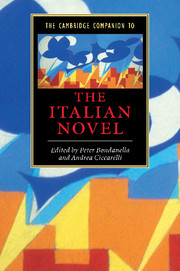Book contents
- Frontmatter
- 1 The belated development of a theory of the novel in Italian literary culture
- 2 The forms of long prose fiction in late medieval and early modern Italian literature
- 3 Alessandro Manzoni and developments in the historical novel
- 4 Literary realism in Italy
- 5 Popular fiction between Italian Unification and World War I
- 6 The foundations of Italian modernism
- 7 Neorealist narrative
- 8 Memory and testimony in Primo Levi and Giorgio Bassani
- 9 The Italian novel in search of identity
- 10 Feminist writing in the twentieth century
- 11 Italo Calvino and Umberto Eco
- 12 Literary cineastes
- 13 Frontier, exile, and migration in the contemporary Italian novel
- 14 The new Italian novel
- Index
- Series List
14 - The new Italian novel
Published online by Cambridge University Press: 28 May 2006
- Frontmatter
- 1 The belated development of a theory of the novel in Italian literary culture
- 2 The forms of long prose fiction in late medieval and early modern Italian literature
- 3 Alessandro Manzoni and developments in the historical novel
- 4 Literary realism in Italy
- 5 Popular fiction between Italian Unification and World War I
- 6 The foundations of Italian modernism
- 7 Neorealist narrative
- 8 Memory and testimony in Primo Levi and Giorgio Bassani
- 9 The Italian novel in search of identity
- 10 Feminist writing in the twentieth century
- 11 Italo Calvino and Umberto Eco
- 12 Literary cineastes
- 13 Frontier, exile, and migration in the contemporary Italian novel
- 14 The new Italian novel
- Index
- Series List
Summary
While during the closing decades of the twentieth century the Italian novel was relatively successful, not so long ago, in the 1980s, critics were lamenting the allegedly bleak future of the genre. At the center of this polemical argument about new “young writers” was the controversial statement by Edoardo Sanguineti (1930- ) that the style and content of these new writers constituted a useless elegance. Some of the writers under attack were Antonio Tabucchi, Pier Vittorio Tondelli (1955-91), Daniele Del Giudice (1949- ), Andrea De Carlo (1952- ), Aldo Busi (1948- ), and Roberto Pazzi. Paradoxically, to outside observers of the Italian scene in France and Germany, the Italian novel at that moment and in the following years seemed so healthy that foreigners were envious of its successes at home and abroad, and translation of the works of not just Umberto Eco but also of Tabucchi, Alessandro Baricco (1958- ), Susanna Tamaro, Paola Capriolo (1962- ), and many others began to attract readers from around the world.
It is a puzzling characteristic of the Italian literary scene that contemporary fiction is criticized for its lack of social or political awareness. For example, some academic critics have attacked Umberto Eco’s best-selling fiction and those who imitate postmodern pastiche on these grounds.
- Type
- Chapter
- Information
- The Cambridge Companion to the Italian Novel , pp. 214 - 232Publisher: Cambridge University PressPrint publication year: 2003



